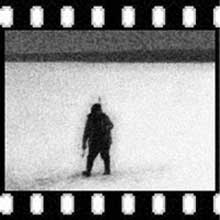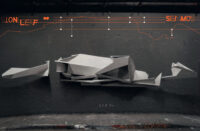
An improvisational collaboration between Latvian duo Oloolo and sound designer Derek
Holzer, Kosta is a micro album of micro sounds. Holzer sampled the passage of air through bones and other detritus from the decommissioned military base of Karosta and these samples were then treated and manipulated by Kiryll Lomunov and Rodion Zolotarew (Oloolo) to create tiny pieces which creak and rattle and whisper with the ghosts of history. Maksim Borisov
provides the sound of a children’s toy synthesizer for several of the tracks, further adding a
spectral echo to the tiny chattering of sound as if the old bones of small children were being stirred by the ancient wind.
The tracks end with terminal abruptness as if windows were being closed, shutting out the bleak wind, which had been tumbling the dust and chaff of decayed cities. A constant arrhythmia fills these songs obscuring the tiny wisps of melody which flutter like crippled moths beside a fading light bulb. The melody in “BCE” sounds like nothing more than a single lonely breeze making voice through a metal tube berried beneath the rattling chaotic percussion, burying the vestigial humanity still transient in that tiny wind. The 1:42 long “Pop-post” is sliced off in mid-stream; the distressed voice trying to break through the wail of noise is suddenly gone. Mechanized bees swarm for two minutes in “Filtter Shumov,” scouring the memory of the fading voice of “Pop-post” and — equally transitory — they vanish into the cyclic buzz of machine information which persists for the duration of “Without an Information Network of a Meander of the Transistor.”
The seven tracks of Kosta are small flirtations with noise and compressed field recordings. This is glitch theory being applied to the sound of history, the winds of old battlefields and abandoned cities being cut, spliced, and flung — scattershot — into the air. You blink and a track is gone. You exhale and another passes. The jagged atmospheres of Kosta are too short-lived; I was left wanting more.





















